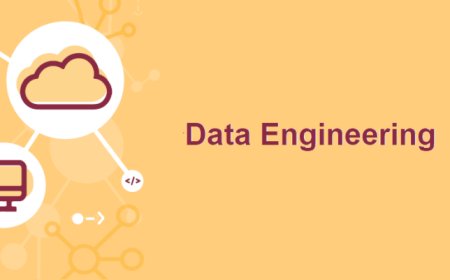Ethical Considerations in Data Engineering: Balancing Innovation and Privacy
Explore the ethical considerations in data engineering, striking a balance between innovation and privacy. Dive into key insights on responsible data practices.

In the digital age, data engineering plays a pivotal role in driving innovation and technological advancement across industries. The vast amounts of data generated daily provide the fuel for developing cutting-edge applications, improving decision-making, and enhancing user experiences. However, as we harness the power of data, ethical considerations become paramount, particularly when it comes to balancing innovation with privacy.
Balancing Innovation and Privacy
Balancing innovation and privacy is a multifaceted challenge in the realm of data engineering. Innovation thrives on the vast pools of data available today, enabling businesses and organizations to develop groundbreaking technologies and insights. However, this pursuit of innovation must coexist with the preservation of privacy, which is increasingly under threat in the digital age.
Privacy concerns arise due to the massive volumes of personal and sensitive data being collected, processed, and shared. Individuals are rightfully concerned about how their data is used, who has access to it, and the potential for misuse. Striking the right balance between pushing the boundaries of innovation and safeguarding individual privacy is not only a moral imperative but also a legal requirement in many jurisdictions.
To achieve this balance, data engineers must consider several critical factors. First, transparency in data collection and usage practices is vital, ensuring that individuals are aware of how their data will be used. Informed consent mechanisms should be in place, allowing individuals to make meaningful choices about sharing their data. Moreover, data engineers must adopt data minimization and purpose limitation principles, collecting only the data necessary for a specific purpose and retaining it for the shortest time possible.
Ethical Considerations in Data Collection
Data collection is the foundational step in the data engineering process and serves as the bedrock upon which insights, decisions, and innovations are built. However, ethical considerations in data collection are critical to safeguarding individuals' privacy, ensuring transparency, and upholding trust in data-driven systems. Several key ethical principles guide data collection practices:
-
Transparency in Data Collection Practices: Transparency entails openly communicating the purpose and methods of data collection to individuals whose data is being gathered. This transparency allows individuals to make informed decisions about whether to participate or share their data. It's essential for organizations to provide clear and accessible privacy policies and consent mechanisms.
-
Informed Consent and Data Consent Management: Obtaining informed consent from individuals before collecting their data is a fundamental ethical principle. Consent should be freely given, specific, and revocable at any time. Data consent management involves giving individuals control over their data, including the ability to opt out or delete their information.
-
Data Minimization and Purpose Limitation: Collecting only the data that is strictly necessary for the intended purpose, known as data minimization, is an ethical practice that reduces the risk of unnecessary intrusion into individuals' lives. Purpose limitation ensures that data is used only for the purposes for which it was originally collected, preventing misuse.
-
Handling Sensitive Data: Ethical data collection requires special care when dealing with sensitive information, such as medical records, financial data, or biometrics. Such data demands heightened security measures and strict access controls to protect individuals from potential harm or discrimination.
-
Anonymization and De-Identification: Data should be anonymized or de-identified whenever possible to protect individuals' identities. Anonymization involves removing or altering personally identifiable information (PII) to prevent re-identification. De-identification techniques ensure that even if data is breached, it remains non-attributable to specific individuals.
Data Quality and Fairness
Data quality and fairness are two crucial aspects of ethical data engineering, closely intertwined to ensure that data-driven systems are not only accurate and reliable but also equitable and just.
-
Data Quality
Ensuring data quality involves maintaining the accuracy, consistency, and reliability of the data used in engineering processes. Inaccurate or inconsistent data can lead to erroneous conclusions and decisions. Data quality encompasses various dimensions, including completeness (ensuring all necessary data is available), consistency (avoiding conflicting or contradictory data), accuracy (eliminating errors and mistakes), and timeliness (keeping data up-to-date). Data engineers must implement data validation processes, data cleansing techniques, and regular data audits to uphold data quality standards. This is essential not only for the trustworthiness of the data but also for the success of any data-driven initiative.
-
Data Fairness
Data fairness focuses on preventing bias and discrimination in data engineering and analysis. Biased data can perpetuate and exacerbate existing inequalities when used to train machine learning models or inform decision-making processes. Data fairness involves identifying and mitigating biases in data, ensuring that the data reflects the diversity and reality of the population it represents. Techniques such as data preprocessing, algorithmic fairness, and model interpretability are essential to address fairness concerns. Ethical data engineers aim to create systems that do not discriminate against individuals based on race, gender, age, or any other protected characteristic.
Data Security and Protection
Data security and protection are fundamental pillars in the field of data engineering. They encompass a range of measures and practices designed to safeguard data from unauthorized access, breaches, theft, and tampering. In an era where data is often considered one of the most valuable assets for organizations and individuals alike, ensuring its security and protection has become an imperative.
One key aspect of data security is securing data throughout its entire lifecycle, from its initial collection or creation to its eventual deletion or archival. This involves implementing robust encryption mechanisms to make data unreadable to unauthorized parties, both during transmission and while at rest in storage. Encryption techniques, such as SSL/TLS for network communication and encryption algorithms for data at rest, are essential components of data security.
Additionally, access controls play a vital role in data protection. Organizations must carefully manage who has access to data and under what conditions. Access should be granted based on the principle of least privilege, meaning individuals or systems should only have access to the data necessary for their specific roles or tasks. This minimizes the risk of unauthorized access or misuse.
Furthermore, data security and protection efforts must comply with relevant data protection regulations and standards, such as the General Data Protection Regulation (GDPR) or the California Consumer Privacy Act (CCPA). These regulations mandate how data should be handled, stored, and protected, and failure to comply can result in significant legal and financial consequences.
Ethical Considerations in Data Sharing
Ethical considerations in data sharing are a critical aspect of responsible data management and usage. Data sharing involves the exchange or distribution of data between organizations, individuals, or entities, and it raises several ethical questions and concerns. Here are some key points to consider:
-
Transparency: Transparency in data sharing is essential. Organizations should be clear about what data they are sharing, with whom, and for what purpose. Lack of transparency can erode trust and raise ethical concerns.
-
Informed Consent: When sharing data, especially personal or sensitive data, it's important to obtain informed consent from individuals. This means that individuals should be aware of what data is being shared, why, and with whom, and they should have the option to opt in or opt out.
-
Data Anonymization: To protect privacy, data shared should be anonymized or de-identified whenever possible. This means removing or encrypting personally identifiable information (PII) to prevent the identification of individuals.
-
Data Security: Ensuring the security of shared data is a significant ethical obligation. Data breaches can have severe consequences, including identity theft and financial loss. Proper encryption, access controls, and secure storage are essential.
-
Fairness and Bias: Ethical concerns arise when shared data is used to develop algorithms or make decisions that could perpetuate biases or discriminate against certain groups. Data sharing should be done in a way that promotes fairness and avoids discrimination.
Future Trends and Challenges
The field of data engineering is dynamic and constantly evolving, driven by technological advancements and changing societal expectations. Understanding future trends and challenges in ethical data engineering is crucial for professionals and organizations to stay ahead in this rapidly transforming landscape.
One prominent trend on the horizon is the increasing reliance on artificial intelligence (AI) and machine learning (ML) in data engineering. While these technologies offer tremendous potential for optimizing data processes and generating insights, they also introduce ethical complexities. Challenges such as algorithmic bias, explainability of AI systems, and ensuring fairness in AI-driven decisions will become even more pressing. Ethical data engineering will need to address these issues by developing guidelines and best practices for building and deploying AI and ML models responsibly.
Another significant trend is the expansion of privacy regulations worldwide. Regulations like the European Union's General Data Protection Regulation (GDPR) and the California Consumer Privacy Act (CCPA) have set the stage for increased data protection measures. As more regions adopt similar frameworks, organizations operating globally will face the challenge of harmonizing their data practices to comply with multiple, sometimes conflicting, regulations. Ethical data engineering will need to navigate this complex regulatory landscape, emphasizing the importance of robust data governance and privacy-by-design principles.
Data engineering is at the forefront of technological innovation, but it also carries significant ethical responsibilities. Balancing innovation and privacy requires a concerted effort from data engineers and organizations alike. By prioritizing data privacy, ensuring fairness, and adhering to ethical guidelines, we can harness the power of data engineering for positive outcomes while respecting individual rights and societal values. Ethical data engineering is not just a legal obligation; it's a moral imperative that can help shape a more equitable and responsible future for technology and society.










































